4-Course Wild Food Feast & Native Beverages
May 11th – 21st
This post focuses on my event at Polly’s Paladar supper club, where The Living Wild Project prepared a four-course meal and beverages from wild, seasonal edibles and then served the meal to 50 people. See the 19th below for the menu. It was challenging to pull together but with help from my fellow gatherers and expert chef Ryan Dutillieul, we served a delicious wild food feast and enjoyed an inspiring evening. Grayson Coney, Tsi-Akim Maidu Cultural Director, shared traditional songs on his Elderberry Clapper as an especially moving contribution to our deep connection to the landscape we inhabit.
11 Wild Lilac Wake Up Tea: Gather the flowers and dry for poison oak remedy. Cover with boiling water and steep overnight any or all of the following: wild lilac flowers, oak bark, manzanita leaves, walnut leaves. Gather the leaves and dry for later use as a green tea substitute. Steep for only 3 minutes and then strain out leaves.
12 Taught wild edible class at Morning Sun Herb Farm: Redbud Cornbread (used my frozen redbud flowers), Manzanita Cider. I’m looking for improvements to this recipe or other standard cornbread favorites that could be turned into a wild recipe.
13 Douglas Fir Tips: The bright green tips are fading at lower elevations so I’m going higher to collect. The branches are good anytime of year as a tea, but the tips in the spring have the highest content of vitamin C.
14 Douglas Fir Tip Sorbet: experimenting with Bob at Treats in Nevada City on the best recipe. Using sugar and not honey or agave, seems to work best since it doesn’t overpower the flavor of the fir. We also steeped the tips and doubled the quantity of tips.
15 Mosquito Spray Experimentation. I went outside with my kids during dusk, at prime mosquito time, to test the effectiveness of my new bug spray. It needs either two applications or more coyote mint. Steeping mugwort, bay and coyote mint overnight seems to be the most effective combination. Wild Yarrow Ale tasting at Daniel’s to prepare for the Polly’s Paladar.
16 Monkeyflower: I tasted the greens which are reportedly a good salad substitute but they seem too chewy and oily for me!
17 Wild Sweet Pea Tips—delicious fresh
18 Harvesting Locust Blossoms—gather the sweetest ones where you see the bees!
19 Polly’s Paladar Menu:
Beverages
Antioxidant Manzanita Berry Iced Tea (non-alcoholic)
Probiotic Fir Tip Apertif (non-alcoholic, fermented beverage)
Immortality Ale: Yarrow, Reishi Mushroom, KitKitDizze
Effervescent Honey Wine: Manzanita & Toyon Berry
First Course-Appetizer
Black Oak Nut & Manzanita Crackers with Goat Chèvre & Elderberry Syrup
Menu Notes: Gluten-free Oak nuts (acorns) are high in Vitamin A, Folate and Omega-6 and Manzanita berries, gathered in the summer, are ground into sweet, gluten-free flour. Elderberries are gathered in the summer and simmered with honey to make the syrup.
Second Course – Soup
Raw Cattail Heart Soup with Locust Blossoms & Golden Cattail Pollen Manzanita & Elderberry Muffins
Menu Notes: Cattail hearts, the inner stalks gathered in the spring, provide a good source of beta carotene, niacin, potassium and Vitamin C. Golden Cattail Pollen is high in minerals and protein, gathered by gently shaking the flower heads into a paper bag. Locust is a non-native tree that blooms in the spring. Gather the white, vanilla-like blossoms and enjoy raw and on salads and soups. The muffins are prepared with local Manzanita berries and Elderberries, which are each 3x higher in antioxidants than Blueberries and Pomegranates. The muffins are gluten-free, sweetener-free and antioxidant rich.
Third Course – Main
Roasted California Quail with Wild Currants & Morel Mushroom Gravy
Pine Nut Heritage Fritters
Wild Sweet Pea Tips with Manzanita Vinaigrette
Notes: California Quail were hunted by the local Maidu and provided a key part of the indigenous diet of this region. Highly desirable Morel mushrooms are harvested in the spring. Pine Nuts have been a significant source of food in this landscape for thousands of years. They contain a 30% protein and are harvested from the local Gray Pine in the fall. Wild Sweet Peas are an abundant, non-native plant and the Vinaigrette is made from the berries of the Manzanita.
Fourth Course – Dessert
California Bay Ice Cream & Spring Douglas Fir Sorbet
Chocolate Oak Nut Marzipan
Tasting of White Locust Blossom Vermouth
California Bay is an evergreen tree, with a strongly aromatic leaf, which grows near local creeks and the Yuba River. Douglas Fir Tip Sorbet offers refreshing and sweet Vitamin C and Oak Nut Marzipan is gluten-free with oak nuts, and almonds, dipped into organic dark chocolate. Fresh, Spring Locust Blossoms are soaked in white vermouth for a week to create this digestive beverage.
Gatherers: Matt Berry, Alicia Funk, Daniel Nicholson, Karouna Thompson, Anna Werderitsch; Preparers: Ryan Dutillieul, Alicia Funk; Deliverers: Tiffany Malakian, Karouna Thompson, Anna Werderitsch Lizzie Hart; Musician: Grayson Coney—Tsi-Akim Maidu Cultural Director; Artists: Franceska Alexander, Matt Berry, Grayson Coney, Farrell Cunningham, Mike Snegg, Karouna Thompson, Holly Tornheim, Peggy Wright; Florist: Karouna Thompson, native flowers in handwoven wild plant basket; Hosts: Megan and Amani
20 Taught wild food walk and class at Soil Born Farms: Manzanita Cider Tasting; Manzanita Salad Dressing on Sweet Pea Tips
21 Elderflower ‘Champagne’ (non alcoholic)
10 flower heads; 2 cups sugar, dissolved in 3/4 cup boiling water; 1 ½ tablespoons white wine vinegar; 2 lemons, juice and rind; 12 cups water
Mix all the ingredients and allow to steep overnight. Strain and bottle into sterilized bottles. Open after 1 week to release air and then reattach lid. Enjoy after 2 weeks.
One comment on “4-Course Wild Food Feast & Native Beverages”
Comments are closed.




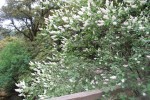
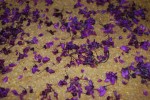
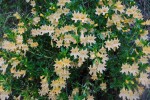

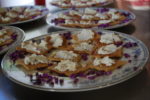

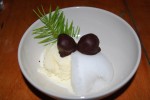

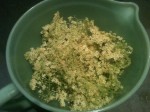
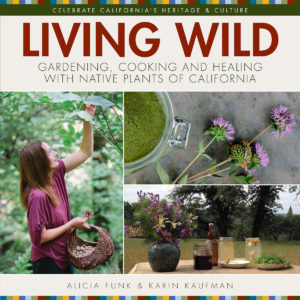
What a wonderful informative site.
Thank you for all the new ideas (old) for
good and healthy use.
Thank you,
Katherine